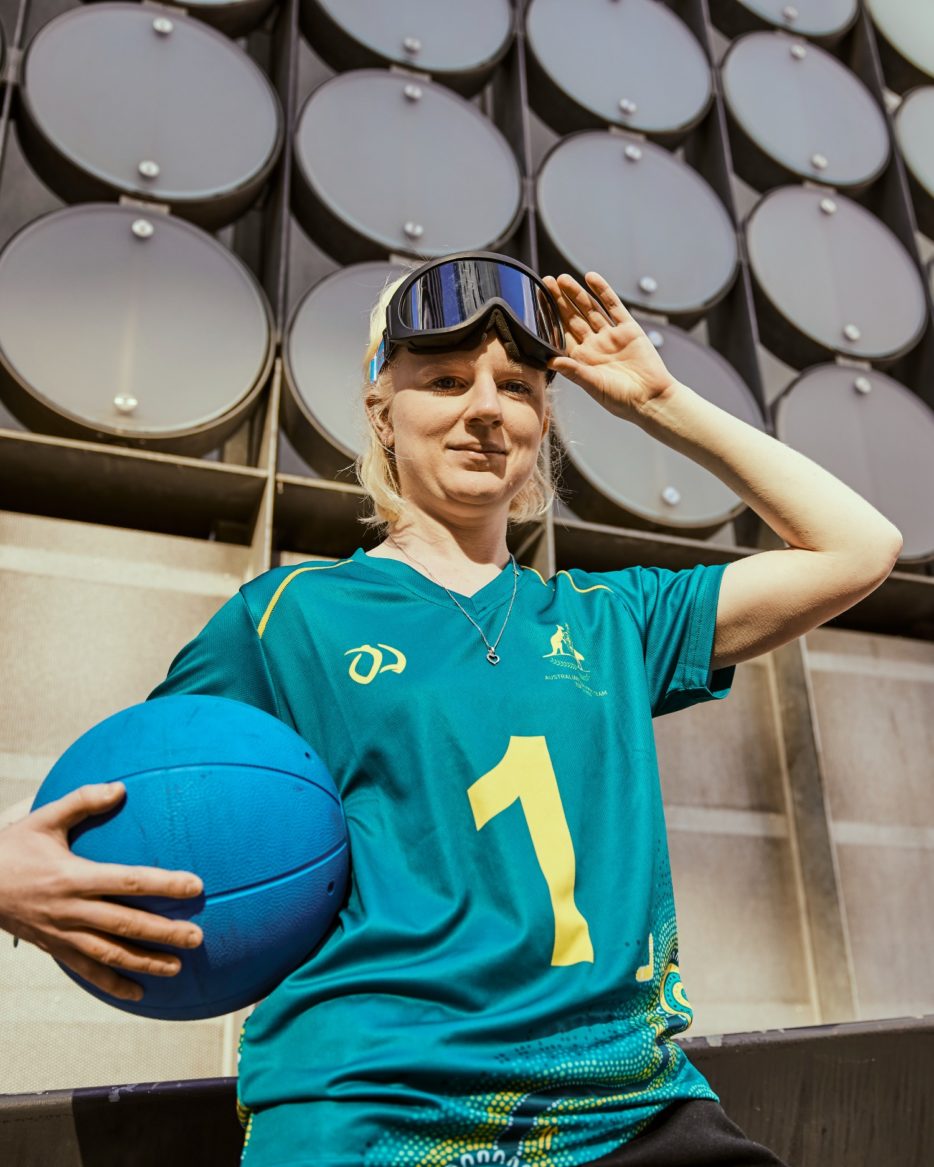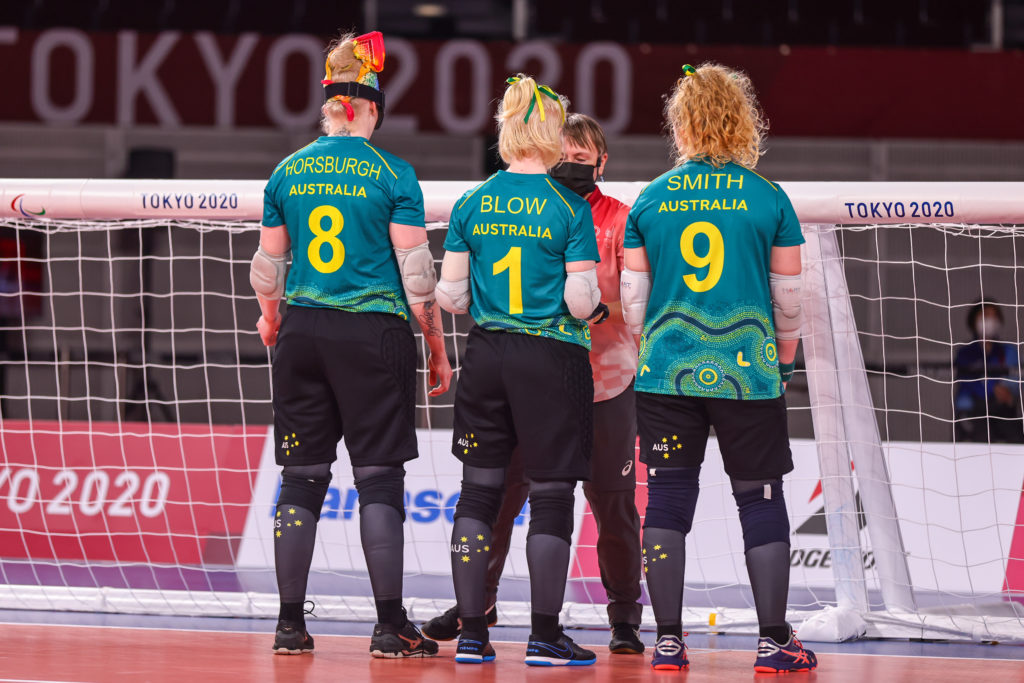We Australians are stereotypically a simple breed: we’re sand and surf loving, butter to Vegemite ratio connoisseurs who are obsessed with a giddy romance of backing an underdog.
On the 28th August 2021, Jennifer (Jenny) Blow and her fellow Aussie Belles teammates fed into the latter, breaking the Australian women’s goalball team’s gruelling 25-year winning drought by securing their first-ever Paralympic victory with a 4-3 win against a strong Canadian outfit.
For context into just how strong the Canadian side was, the country’s record of five Paralympic medals is surpassed only by the US team, which has seven.
Having lost 11-1 to Israel and 6-nil to China in their opening two preliminary rounds, the world couldn’t help but assume it was game over for the Belles’ Tokyo campaign before they even stepped onto the court.
The Belles, however, had other plans. Armed with incredible self-belief and worth, they defied all odds, with a historic win that made for a spine-tingling underdog story of dreams back home.
Suddenly, the lesser-known sport of goalball was thrust into the spotlight. Living rooms throughout the country followed the free-to-air TV broadcast, witnessing the Belles back up their win with a 4-1 result over undefeated reigning world champions Russia to secure a quarterfinal birth, where they sadly went down 10-6 to Turkey.
Despite the campaign-ending loss, the team returned home with this unbelievable achievement etched into the history books, a new wave of exposure and a promising future for the sport.
Sat in hotel quarantine in Melbourne, Jenny reflected on the extraordinary impact of her team’s success in Tokyo.
“It has been so heart-warming to hear of all the support we have had. You read all these amazing comments from people who are seeing goalball for the first time on social media. Being such a small sport without an able-bodied counterpart, we have truly struggled to get the same recognition and support as other Paralympic sports, but now so many people know what goalball is. I really hope it helps the sport and the future players.”
While you likely would have heard and seen goalball spread across the media in recent months, you’d be forgiven for still not being quite au fait with how it all works. So, here’s a quick rundown:
Invented in 1946 to assist rehabilitated veterans who had lost their sight during the Second World War, goalball is designed for athletes with vision impairment. Teams are made up of six players, with three members playing at any one time. Essentially, the objective is to roll a basketball-size ball with bells inside over the opponent’s goal line while they listen for the oncoming ball and attempt to block it with their bodies. To ensure fair competition, all players must wear opaque eyeshades.
It’s a game that requires significant spatial awareness, concentration and listening skills. All of which Jenny has managed to master in over a decade of competing.
REWIND TO 2009
So how exactly did a young student get involved in this under the radar sport and end up capturing our attention and hearts on the world stage? Well, we can’t help but cheekily claim the small role Sydney University played in this narrative.
“In 2009, I was studying a Bachelor of Education/Arts at USYD and was always looking out for any work experience opportunities. My friend, and Aussie Belles teammate, Tyan (Taylor), introduced me to a lady who was teaching a modified version of goalball in schools. She was looking for some other people to go out to schools to teach goalball. I saw this as a great opportunity and learnt the sport so that I could teach it.”
It quickly became apparent that Jenny and Tyan’s talent extended beyond the school gym. So the pair were encouraged to try out for the NSW Women’s team for the upcoming national championships
“We originally competed just for fun with no expectations of winning a game, but we picked up the sport quite quickly and ended up coming second to Queensland, who at the time made up the Australian team. After Nationals, we were invited to attend an Australian training camp, and from there, I stayed on the training squad and made every international team since 2010.”
And what an incredible eleven years it’s been since for Jenny, who now boasts an enviable sporting CV brimming with triumphs, including three Paralympic campaigns
NO SOB STORY
From her first Paralympic debut in London 2012 to Covid-stricken Tokyo 2021, Jenny has undoubtedly witnessed the Games evolvement.
“The media coverage and understanding of the Paralympic Games and Parasports has improved dramatically from London to Tokyo,” she said.
“People are starting to realise that Paralympians are elite athletes who train extremely hard to qualify for the Games and represent Australia. We aren’t just a sob story.”
Born with a vision impairment, Oculocutaneous Albinism, Jenny vouches for the positive impact sport can have on people with disabilities.
“Sport has so many benefits for any young person, but specifically, people with disabilities can gain so much from participating in sports, and sports need to be more accessible for people with a disability.”
“I hope the coverage goalball received during the Tokyo Paralympic Games results in some young vision impaired kids wanting to come to try goalball so the Aussie Belles can continue developing and improving internationally.”
Back at Camperdown, the goalball movement certainly is upon us, and Sydney Uni Sport & Fitness (SUSF) is committed to developing more inclusive sporting opportunities for our students. In April, SUSF hosted an Inclusive Sports Gala Day, supported by NSW Goalball and Blind Sports NSW. The inaugural competition attracted close to 100 people, proving there’s a promising future for goalball on campus.
OFF THE COURT
After graduating from Sydney University and SUSF’s Elite Athlete Program, Jenny landed a full-time English/Drama teaching position in Sydney, where she taught for five years before moving to Melbourne and focusing on her goalball career.
However, having just announced her Paralympic retirement after the quarterfinals match in Tokyo, Jenny is ready to embrace the next chapter of her life, with teaching back on the cards.
“I have taken a break from classroom teaching the last two years to work as the Education Manager at Paralympics Australia, and I love this job, but my passion is in the classroom, so I hope to return to full-time teaching down here in Melbourne.”
When asked what advice she would give to her younger self, the message was powerfully pure.
“Love yourself and believe in yourself. You might look different; you might have a disability, but you still are an incredible person who can achieve anything you want in life.”
Practising what she preaches, Jenny’s tenacity, resilience and commitment has paved the way for her career to date and will certainly continue to place her in good stead for what’s to come.
Take a bow, Jenny. You inspire us all.

